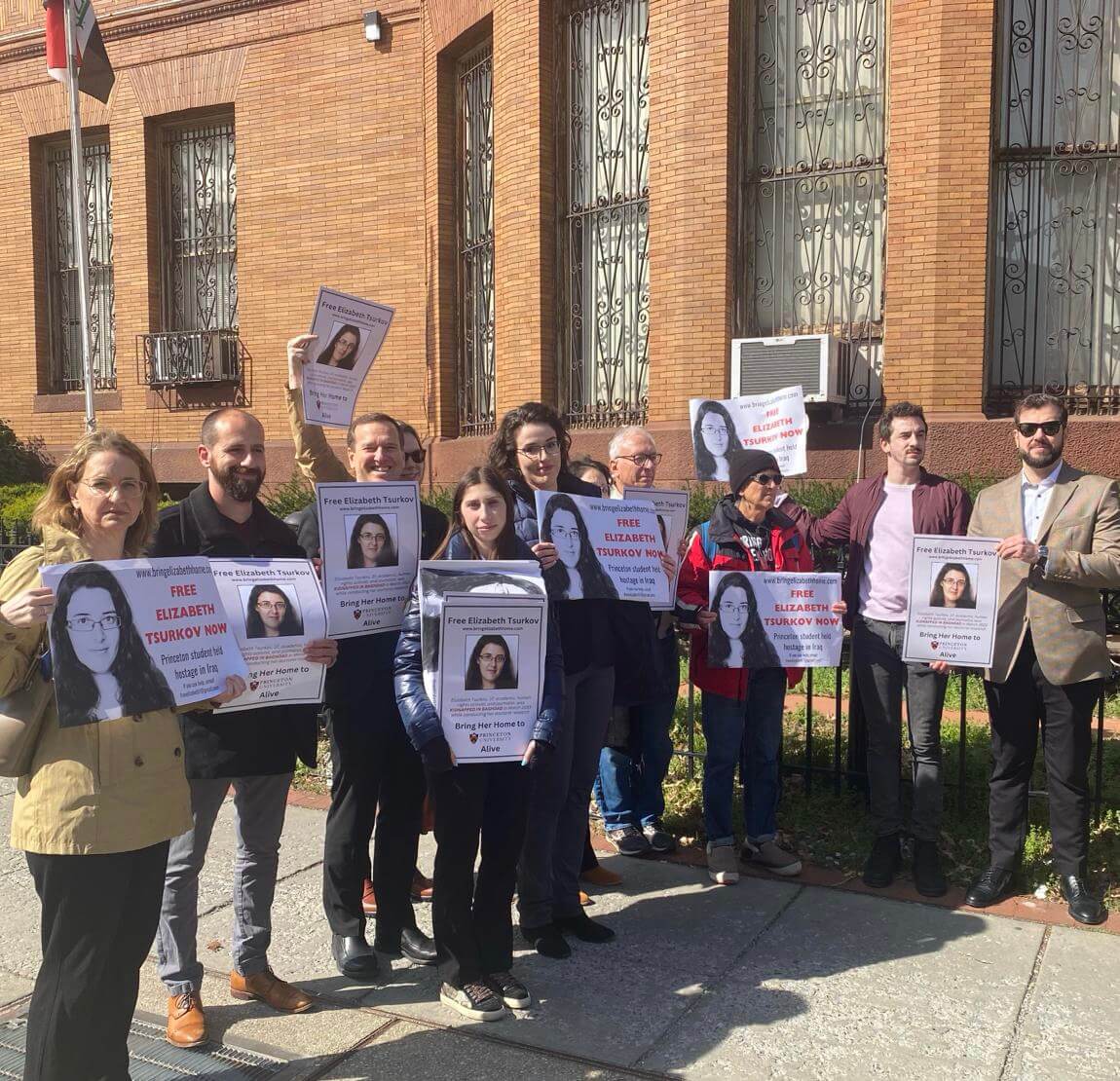My tax dollars — and yours — are helping hold my sister hostage
The US is both fighting and funding a terror organization in Iraq

Supporters of Elizabeth Tsurkov, an academic kidnapped in Iraq a year ago, held a rally at the Iraqi Embassy in Washington, Mar. 21, 2024. Her sister Emma is standing center, with glasses. Courtesy of Dafna Lender
When I learned that Iraq’s Prime Minister Mohammed Shia’ Al Sudani would be visiting the White House today, hot rage washed over me. A year ago, it would have been a meaningless news nugget. But now it is an affront, a reminder of the absurd horror that my own tax dollars are helping fund the monsters holding my sister hostage.
My sister Elizabeth Tsurkov, a doctoral student at Princeton University, was kidnapped in broad daylight on March 21, 2023, from one of the safest neighborhoods in Baghdad, where she was doing fieldwork for her political science dissertation. She has spent 391 days as a captive of Kataib Hezbollah, an Iran-backed Shiite militia in Iraq I’d never heard of before. What I’ve learned since is as absurd as it is outrageous.
Elizabeth is my Irish twin, now 37 to my 36. Throughout our childhood we shared most of our waking and sleeping hours. Until we were teenagers, we shared a rickety bunk bed whose noises woke both of us up whenever one rolled over. Her calm breaths as she sleeps are a fixture in my life, more stable than anything else in the world. Now I wonder if she is even able to sleep in captivity.
The first few days after Elizabeth’s abduction still feel like an overwritten TV series. At first I hoped that she had been in a car accident, because it seemed like the least awful explanation for why she would not pick up her phone. Several weeks into her disappearance, though, that hope was dashed as I learned that my sister, a Jewish woman, was being held hostage by an Islamist terror group in Iraq. The thoughts about what she must be going through are an ever-expanding abyss of horror.
Several media outlets heard Elizabeth had gone missing, and rumors started spreading. Hoping to keep the stakes of any potential negotiation for her freedom as low as possible, I managed to persuade the reporters not to make the situation public.

During this period, I lived a double life. During the day I was a working mom of a baby boy. At night I gave myself a crash-course on K.H., other Shiite militias, Iraqi politics and terror funding.
The cold facts about my sister’s captors are chilling: The United States designated the group a terror organization in 2009, and it is notorious for violence against American interests. In late 2022, K.H. killed Stephen Troell, a U.S. citizen running an English language institute in Baghdad, during a botched kidnapping attempt only a few streets from where Elizabeth would be taken months later. The U.S. also blames the group for an attack this January that killed three American troops and injured 34 others on the Jordan-Syria border.
But as I dug deeper, I learned that our government in Washington is both fighting and funding K.H.
The group, founded in 2007, joined other militias in 2014 to establish something called the Popular Mobilization Forces, an umbrella organization to coordinate the fight against the Islamic State group. Two years later, the war on IS had wound down, but the P.M.F. was not disbanded. Instead, according to the U.S. office of the Director of National Intelligence, it was integrated into the Iraqi government, essentially making P.M.F. members employees of the state.
The United States, of course, provides large amounts of aid to Iraq — $630 million in 2022, for example. About 40% of that is military assistance.
I told myself I must be misunderstanding something. Could it really be true that the Iraqi government directly employs known terrorists — and that the U.S. essentially helps pay their salaries? It simply did not compute.
Last July 5, I woke to the news that an obscure website had broken the story of my sister’s kidnapping. The New York Times was about to publish an article about the situation, and I was swarmed with calls from other reporters. I repeated myself again and again, emphasizing that Princeton had approved and funded the dissertation, and that Elizabeth had published articles about her research trips widely, frequently, eloquently and in multiple languages.
(Editor’s note: She had also published more than a dozen opinion articles in the Forward, about Iran, Russia, Israel and the Palestinian conflict, between 2014 and 2020.)
With Elizabeth’s abduction now public, I engaged experts, notably from the Washington Institute for Near East Policy, to help me reconcile the apparent absurdity of a close U.S. ally employing the terrorists holding my sister. I still believed that the emperor was well-dressed. I was wrong.
Case in point: On Feb. 7, a U.S. drone strike blew up a car in Baghdad, killing Abu Baqr al-Saeedi, a K.H. leader and P.M.F. member, in retaliation for the January attack on U.S. troops on the Jordan-Syria border. Because Saeedi was a member of the P.M.F. he was also on the Iraqi government payroll, and accordingly, a subordinate of the Iraqi prime minister.
I also discovered that K.H. has a political wing called the Harkat Hoquq party, which holds six seats in Iraq’s parliament. Hoquq members were part of the coalition that voted in October 2022 to establish the current Iraqi government and make Al-Sudani prime minister.
This Iraqi government has ignored, gaslighted, and misdirected my family repeatedly throughout the year, all the while doing nothing to free my sister. Foreign Affairs published an article by the prime minister last week claiming that his government is focused on enhancing human rights, empowering women and generally fostering the principles of freedom and democracy. He also wrote about the increased competency of the Iraqi armed forces. Hard to reconcile that with the incompetent response to my sister’s kidnapping by a group with strong ties to the Iraqi government.
How is the prime minister, who employs known terrorists and relies on them politically, being welcomed into the Oval Office today to meet with President Joe Biden?
The Iraqis want a productive visit to Washington, and are paying multiple lobbyists to pave their way. The Biden administration wants to showcase an ally from the Middle East.
But the U.S. government knows that its counterpart is harboring a designated terrorist group with American blood on its hands.
My blood boils each time I envision Sudani shaking Biden’s hand while the keys to my sister’s shackles are in his pocket. The White House should make it a priority to force Sudani to help free Elizabeth.
A message from our Publisher & CEO Rachel Fishman Feddersen

I hope you appreciated this article. Before you go, I’d like to ask you to please support the Forward’s award-winning, nonprofit journalism so that we can be prepared for whatever news 2025 brings.
At a time when other newsrooms are closing or cutting back, the Forward has removed its paywall and invested additional resources to report on the ground from Israel and around the U.S. on the impact of the war, rising antisemitism and polarized discourse.
Readers like you make it all possible. Support our work by becoming a Forward Member and connect with our journalism and your community.
— Rachel Fishman Feddersen, Publisher and CEO




























